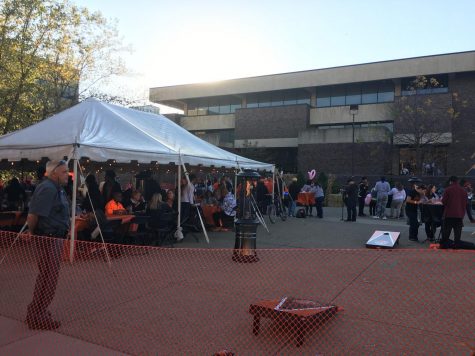Your immune system: Will work for food

Over the past few years, my attention has been brought to the growth of allergen-free food aisles in grocery stores. It seems like as time goes on, there is an exponential increase in people that require special diets.
A theory that I have heard in the past is that there are more toxins in our environment that compromise the healthy functioning of our bodies. I think there is a lot of truth there.
That concept brings to my mind all the hefty lists of 10-letter words on food packaging, and the unnatural colors of foods meant for children. How can a human body develop correctly with a constant flow of neon-green dye, high-fructose corn syrup and oily chunks of reshaped animal cartilage?
One idea that I heard recently at a food allergy forum led by allergist Dr. Andrew Green is that people are living too far removed from the dangers of their environment resulting in an ill-equipped immune system.
It’s ironic to think that being really careful about what you ingest and what you touch can actually end up hurting you. It makes sense, though.
I’ve noticed a trend. The kids I see who have really overprotective parents seem to have more complications with allergies and intolerances. Kids who grow up on organic, completely unprocessed, allergen-free food will probably require those foods once they reach adulthood.
Because some people are raised without exposure to certain factors in the environment that could cause harm in the body, their bodies may not be able to handle those factors if ever introduced.
I recently read an article on CBS News about how a child’s innate urge to pick their nose and eat their own nasal mucous is a behavior that developed through evolution to help boost their immune system. The source for this article was Scott Napper, a biochemist from the University of Saskatchewan. Napper basically explained that by eating the mostly dead microorganisms in your boogers, you give your immune system a chance to identify harmful pathogens, and prepare against future encounters.
The same theory may apply to food. It’s just a theory, but I think people are being too careful with what they eat. It seems like all of a sudden most of the people I know have some sort of dietary restriction. “Oh, I can’t have gluten,” they’ll say. “Is there soy in this?”
Even though I truly enjoy the challenge of baking completely allergen-free desserts, I can’t help feeling that my hard work is in vain. I just refuse to believe that there is such a large population of people with allergies that were barely acknowledged in the past.
I also heard at that forum that people tend to jump right to an allergy test when they have one unusual circumstance. Green said that there are a lot of false positives in food allergy tests, so it’s important to consider your history.
While people should be aware of allergies in the case of anaphylaxis, they shouldn’t be so quick to give up a long list of ingredients that will limit their intake to carrots and olive oil.
My advice? Eat a wide variety of foods and pay close attention to how your body reacts. Just because you got an upset stomach after eating something with soy in it does not mean you should give up soy after having eaten it for the past 20 years of your life.
And for the love of antibodies, eat some nasal mucous every once in a while. You don’t want those vital, half-dead microorganisms going to waste.
Andew Manzella can be reached by email at [email protected].











